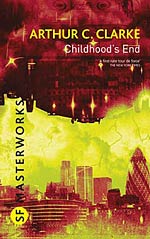
![]() Triseult
Triseult
3/20/2012
![]()
As with many of the great SF classics, Childhood's End is chock-full of thought-provoking Great Ideas. The major fault of the novel, besides the imperfect writing and plotting, is the density of ideas, which end up overcrowding the plot and snuffing out dramatic tension.
Both Arthur C. Clarke's strengths and weaknesses are in clear display in this novel: the ideas are grand and breathtaking, while the prose and plotting are shoddy, borderline amateur.
It's easy not to mind the bad writing when the narrative focuses on awe-inspiring alien ships coming to Earth to end all wars and cure diseases. Or, when the story takes a cosmic turn at the end, and reveals a startling, controversial vision of our destiny as a species. It's easy to understand why this novel launched Clarke as a writer, and why it remains an enduring classic. It represents the best of 1950s SF: deep thinking about future ideas and society-changing concepts, rooted in a firm sense of wonder.
Yet at many points in the novel, the main ideas just slip to the back, while we're being treated to things such as a Ouija session, or the exploration of a frankly boring artistic utopia. It feels like Clarke was trying to cram every idea that came to his mind, and in so doing forgot the main themes driving his story forward. It doesn't help that the characters are flat to the point of being mere sketches, and that Clarke seemed intent to pad his writing with as many useless details as he could think of.
As with any novel from the 1950s, especially SF, there are some amusing bits that date the novel. But thankfully, they are pretty minor. I definitely was puzzled when the Overlords intervene to stop racial conflict in 2000s South Africa by protecting the persecuted white minority. Really?! There was also the awkward statement that future Earth was free of racism, as exemplified by the fact that people now used the N-word openly and without malice. But the most grating idea was when the Overlords state that science was a 'gift of the Western minority' to the rest of the world. That being said, bravo to Clarke for having one of his protagonists be of mixed heritage, then dropping the issue of his skin color entirely from the rest of his narrative.
(Spoiler warnings for the following paragraph.)
My main disappointment with the ending of the novel is that the destiny of Humanity is never questioned by anyone in the novel. We are told by the Overlords that Humanity has only two choices: either becoming a 'thought cancer' that will wreak the Universe, or being assimilated by the Overmind. Yet the Overlords are the very same individuals who have repeatedly lied to Humanity. Why does Humanity trust them, when the very change they have come to assist obliterates Humanity, and destroys the Earth? How is joining the Overmind an evolution for Humanity if it means destroying everything that has ever defined us?
Overall, "Childhood's End" is a great SF novel of ideas, and it's clear why it's a classic. It helps to abandon expectations of great plotting and writing, and instead soak in the thought experiments that Clarke has woven around his many great SF concepts. The ending of the novel is thought-provoking, controversial, and open to a lot of debate and discussion, making the mostly pleasant journey to get there worthwhile.